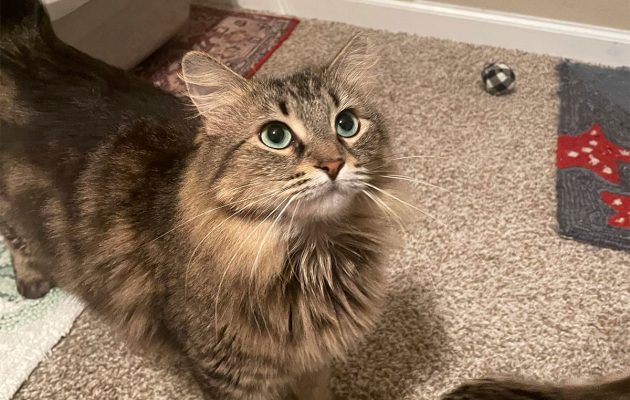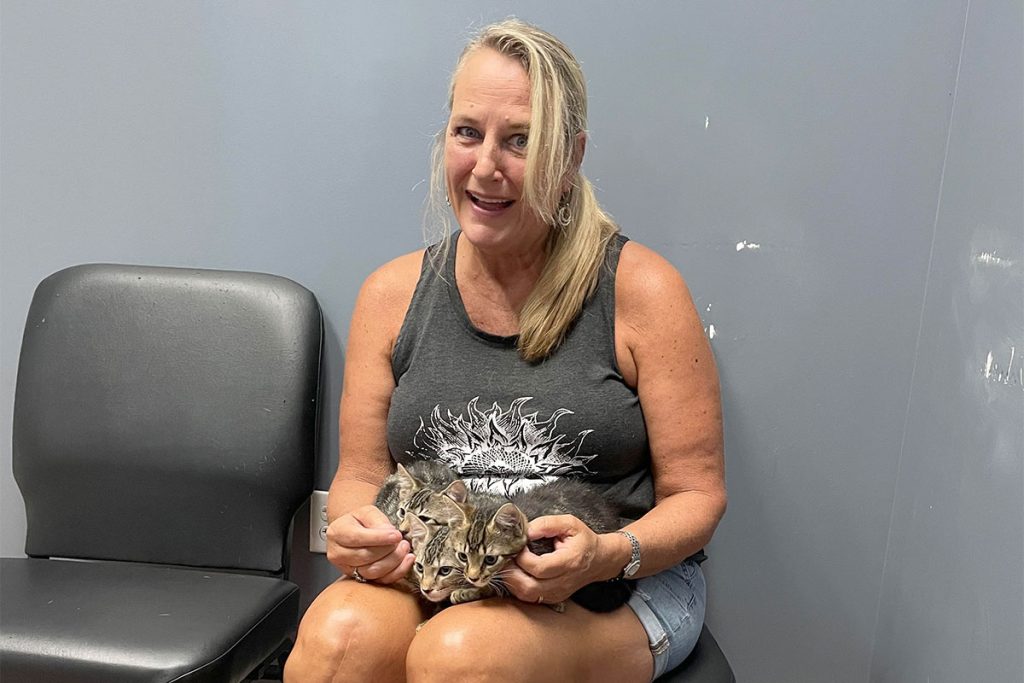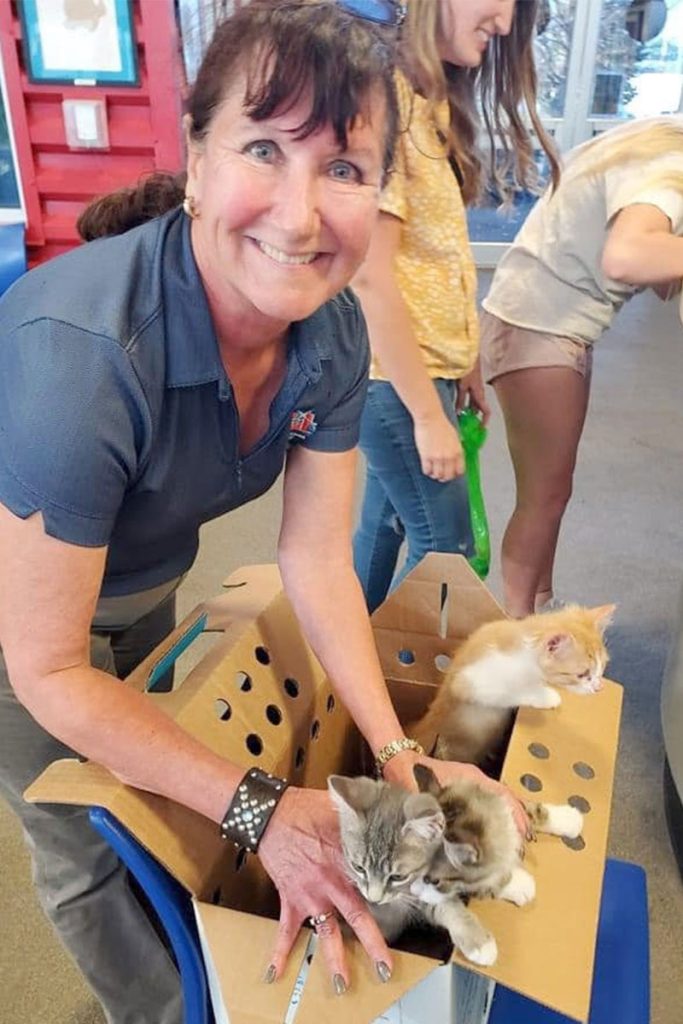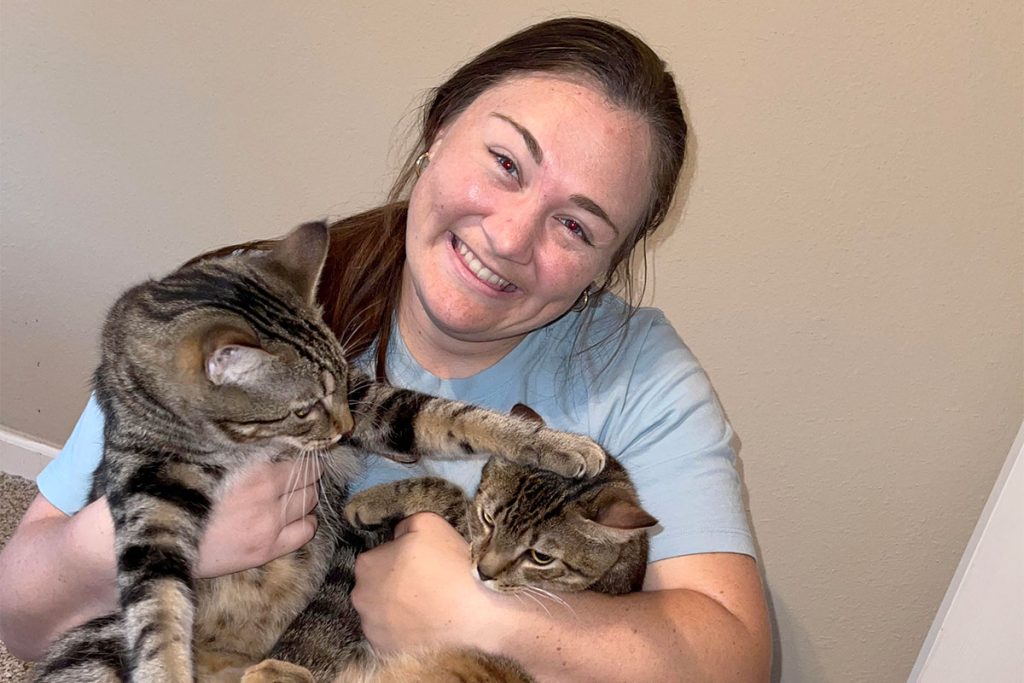Animal House: Kittens, Kitnapping & Krusaders

When a gorgeous, but gaunt, tabby cat with swirly fur appeared at Connie Williams’s home begging for food, Williams rushed to feed her distressed visitor. While the cat would approach and meow for food, it would run if Williams attempted to pet her. Thus began a daily routine between the nervous cat and the retired Southwest Airlines supervisor — one that would end happily for all involved.
The Arrival
“Her body was thin, with rough fur. She had been on her own for a while,” Williams said. “One day, we noticed that she seemed frantic and unusually hungry, almost like the first day she appeared. My daughter, Katie, and I wondered if she was pregnant, but we couldn’t tell.”

Soon after, on a stormy day, Williams looked outside to see how bad the rain was coming down. As she opened the patio door, a tiny kitten hopped down from under Katie’s car in the driveway. Then, one at a time, three more kittens followed.
Katie, who works for the Florida Department of Environmental Protection, had rescued and fostered cats and kittens during college. Katie credits the Jacksonville Humane Society’s (JHS) “Don’t Kitnap” campaign with teaching her the importance of not immediately scooping up those kittens. She knew that the mother cat was probably nearby.
To keep the babies with their mother, but knowing that Kitten Socialization 101 needed to begin immediately, Williams and Katie hatched a plan. Despite their tiny size and being no more than a few weeks old, the kittens were already ferocious, little blue-eyed, spitter-hissers. However, they responded to the calming consistency of gentle voices and handling — the first steps of successful socialization and taming.
The goal was to enclose them on the back patio for safety and access. However, the mother cat rejected their plan and kept relocating her kittens. Sometimes, the women quickly found the family’s new location. Other times, they had to manually pull kittens from under the car or out of the engine to cuddle them. Gradually, the mother cat showed cautious trust in the Williamses.
When the kittens were old enough to be zipped into a soft enclosure, they were placed inside the screened patio with the screen door propped open, in an attempt to lure mom inside. The women watched, ready to attempt the safe capture of the mother cat inside the patio.
“It took forever before she even approached, let alone walked into the patio, but she finally did. It was wonderful when we were finally able to shut her inside and know that they were all safe,” Katie said.
Understanding Feral Cats
The mother cat’s curious-yet-fearful, conflicted behavior characterizes homeless animals that were formerly family pets. They behave like a domestic pet that understands everyday life with a caring family — purring or rubbing against a leg — but the homelessness gradually increases anxiety and fear, sometimes triggering panic and retreat. Even the tamest pet cat can become partially or entirely feral without positive intervention.
A homeless cat must elude or fight off predators, unleashed dogs and other cats. Hunting for food and water are daily needs that, combined with constant fear and danger, negatively affect temperament and personality. Traumatic interactions with humans who mistreat homeless cats are even more psychologically damaging. Besides psychological and emotional damage, homeless pets suffer physical deterioration and exposure to diseases and parasites.
How to Handle Found Kittens
Anyone who finds kittens alone outside should wait and watch until their mother returns, usually within a few hours. Rescuers say the kittens’ best chance to thrive is to stay with their mom, nursing. JHS, Jacksonville’s Animal Care & Protective Services (ACPS), and No More Homeless Pets all offer free advice to assist anyone who finds orphaned kittens alone outdoors, or a homeless mother cat with kittens.
Relocating the family, enclosing them or safely trapping everyone for removal allows the kittens’ normal development, veterinarian care, vaccinations, spaying, neutering and adoption. There are local, free services available to help find veterinarian care and foster homes.
The Williams family successfully saved the mother cat and all the kittens, even a wild-child fifth kitten who miraculously survived alone until the next day when he arrived, yowling outside for help. They enrolled all five tabby kittens in the JHS’s Kitten Krusader program.
The Kitten Krusader program is a partnership between JHS and private veterinarian clinics. They support citizens who find kittens, helping keep these fragile babies out of shelters and in new homes. In overcrowded shelters, the kittens’ immature, weak immune systems expose them to potentially life-threatening illnesses.
ACPS also has dedicated kitten volunteers, the Kitten Army, who care for orphaned kittens until they are healthy and ready for sterilization and adoption. There are many adoptable cats of all ages and personalities available at both JHS and ACPS during adoption hours.

Vicki Cross is one of the longest-serving, if not the most experienced, ACPS kitten volunteer. She has spent fifteen years successfully raising more than 1,100 orphaned kittens. Cross specializes in caring for kittens with ringworms, something many volunteers avoid. Her supportive husband, George, provides socialization.
“No one wants ringworm babies because it’s contagious to humans, dogs, and cats,” Cross said. “But I’m immune to ringworm. I’m also a cat adoption counselor at the shelter. My friend, Becky Hamilton, volunteered at the shelter and said how much they needed help, so I took the class on fostering.”
The Crosses volunteer together as a hobby and encourage volunteering at the shelter, fostering and adopting. They advise cat and kitten fosters or adopters to have scratching posts available and to acclimate cats to nail clipping since declawing can cause negative medical and behavioral problems.
Conquering Kitten Mountain
In most parts of the country, kitten season begins in spring when warm weather triggers unfixed cats to mate and give birth to kittens, according to Best Friends Animal Society. The season typically ends with cold temperatures, except in the South, where year-round moderate weather results in continuous litters of homeless kittens with high survival rates. In 2022, JHS and ACPS accepted 5,352 kittens under five months old.
Anyone feeding unfixed outdoor cats contributes to the kitten crisis by nutritionally boosting mother cats to birth even more surviving offspring, and enabling male cats to father more litters. The only solution is to trap, neuter and release (TNR) outdoor cats. Safe traps are sold at hardware, feed supply or thrift stores. Rescue organizations can provide information about TNR volunteers who can be contacted.
A Tail With a Happy Ending

The Williams’ foster kittens, three males named Bonsai, Cayenne and Nova, and two girls, Chico and Cosmo, and mother Millie all received medical care from participating veterinarians at Durbin Creek Animal Hospital. Millie is now tame, loves petting, and uses her litter box perfectly…after they added a little potting soil. A friend adopted Cosmo. The Williamses fell in love with the rest of their swirly tabby fosters and adopted them all.
Anyone interested in helping kittens should visit jaxhumane.org/foster, or send a gift to kittens through jaxhumane.org/donate. To foster, adopt, volunteer or donate to kittens and cats at ACPS, visit coj.net/departments/neighborhoods/animal-care-protective-services.
Resources
Youtube.com/KittenLady: kitten care videos.
Jacksonville Humane Society
www.jaxhumane.org
8464 Beach Blvd., 32216 | (904) 725-8766
Found kittens & need advice? jaxhumane.org/kittenhelp
Interested in fostering? jaxhumane.org/foster
Want to send a gift? jaxhumane.org/donate
Interested in Kitten Krusader? Email [email protected] with KK in the subject line for Kitten Krusader
[email protected] | [email protected]
First Coast No More Homeless Pets
Hotline/Appointments: (904) 425-0005
6817 Norwood Avenue, 32208 | 464 Cassat Avenue, 32254
www.fcnmhp.org
By Julie Kerns Garmendia
Resident Community News








